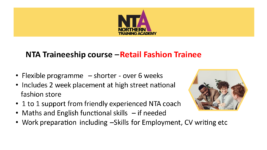E-Commerce Manager careers guide and job profile
Want variety? Being an E-Commerce Manager is a job that can expose you to all aspects of a business!
Getting into E-Commerce Manager careers
How much money can you earn as a E-Commerce Manager?
These LMI Job Trends give you a sneak peek of how much you could earn starting out for this career, and how much your salary could grow with experience.
Average salary for Retail jobs
Recent labour market information says you can earn on average between £16,000 and £50,000 a year as a E-Commerce Manager in the UK.
Your starting salary can vary because of factors like level of experience, training, location or the size of the company. Your salary as a E-Commerce Manager will increase over time as you build skills, knowledge, and experience.
Retail Career FAQs & Insights

Is there something you’d like to know about Retail careers?
Skills you need to become a E-Commerce Manager
Useful skills to put in your CV:
- Organisational skills (aka self-management) – E-Commerce is a fast-paced world where things can change very quickly, so being organised is absolutely essential
- IT Skills – you’ll build digital skills over time, probably including an understanding of web design, social media, e-commerce law, Search Engine Optimisation (SEO,) analytics and more
- Creativity – you’ll need to come up with new ideas to promote your products in a world where your customers are bombarded with many advertisements each day
- Communication skills – this is vital in the world of retail, especially when you’re trying to persuade customers to buy your product online. You’ll be working with lots of different people, so you’ll need to have strong written and verbal communication skills
- Leadership skills – if you’re in a management role, you need to be very skilled at dealing with people and managing your team to get the best out of them
- Teamwork – E-Commerce staff need to work with many other different individuals and teams. On any given day you might be working with senior management, designers, the buying team, and more.
- Customer service skills – retail is all about the customer. You’ll need to put yourself in the shoes of your typical customer in order to work out what kinds of promotional tactics will appeal to them.
- Money skills – you’ll have to work to a budget and justify all purchases. A good understanding of money and and finance is essential
Top Skills-boosting Tip
Practice creating buyer personas. This is a description of someone who represents your target audience.
It can be useful knowing how to create these to really get into the mindset of your typical customer for a product and think about what they would want and buy.
How Do You Get These Skills?
Vocational qualifications and work experience will help you build these skills over time.

Build Your Skills With the FREE Young Professional Programme
What Qualifications & Training Do You Need For Retail Careers?
School and training
You can apply for a graduate training scheme with a company if you have a degree.
You can learn new skills like digital marketing through doing free online courses from the Skills Tool Kit.
University degrees and graduates
You can do a degree before joining a retail company graduate scheme. Employers recruit from a range of degree subjects. Some particularly relevant subjects include:
- marketing
- fashion buying and merchandising
- fashion and business
- retail business management
It’s important to gain experience during your degree through things like work shadowing, internships or year in industry placements.
UCAS has more information on degree courses and entry requirements.
T-Levels
T-Levels are a choice for learners after GCSEs alongside apprenticeships and A-levels.
T Levels, an alternative to A-Levels, are qualifications in vocational, technical and hands-on subjects that you can choose to do after GCSEs instead of traditional academic qualifications.
They include a mixture of classroom-based learning and industry placements where you can put your new skills into practice in real-world scenarios.
T Levels in Accounting and Finance could be useful.
You may need 4 or 5 GCSEs at grades 9 to 4 (A* to C), or equivalent, including English and maths for T Levels.
BTECs
As an alternative to A-Levels, you can do BTECs from the age of 16. There are a number of BTEC subjects you might want to consider if you are interested in becoming a E-Commerce Manager.
You could do a BTEC in Digital Marketing, Business, Retail or a similar subject.
You’ll normally need 2 or more GCSEs at grades 9-3 (A*-D) or equivalent for a Level 2 or 3 course. If your qualifications are lower than this, you’ll most likely start on a Level 1 course.
Apprenticeships
An apprenticeship is a scheme where you train while earning a starting salary. With an apprenticeship (or advanced apprenticeship) you’ll have a paid job with an employer that includes structured training and learning. This training leads to an official qualification that’s recognised by employers as an industry standard.
These degree apprenticeships are relevant to this role:
- digital marketer
- express delivery manager
- retail leadership
Anyone over 16 can study for an apprenticeship. You will normally need at least 5 GCSEs at grades 4-9 (A*-C) to study for an apprenticeship, including English and Maths.
A-Levels
A Levels are academic qualifications that come after GCSEs. A Levels can be an ideal stepping stone to an advanced apprenticeship, a degree, a job, or going straight into a freelance career.
Any A Levels relating to Business and Maths could be useful.
You’ll normally need GCSEs at grade 4 (C) or above in English and Maths. 2 to 3 relevant A levels, or equivalent, are usually required to complete a degree.
Career Progression
Where your career could take you…
E-Commerce Manager is quite a senior role and won’t be one you’ll start in straight away. As you gain experience, you can move into roles such as E-Commerce Specialist, E-Commerce Manager or even Head of E-Commerce.
You could also move into related areas of retail such as Buying, Product Management, Marketing, or senior leadership roles (such as becoming head of a department, division or area.)
E-Commerce roles can be a great springboard for working in other areas of the IT industry, or even for setting up your own business as an E-Commerce Specialist or Consultant.
You could also move into related areas of retail such as Product Management, Marketing, or senior leadership roles (such as had of a department, division or area.)
What Work Experience Do You Need For Retail Jobs?
Work Experience Tips
It can help you decide if this is the right career for you if you have previously done work experience in retail. Work experience in a retail environment can help you build useful skills.
Examples of relevant work experience include:
- Work shadowing (even if it’s just for a day)
- Work placements in a company
- Work experience placements on a college or university course
You could start working as an assistant in a retail buying or marketing department and become an e-commerce manager through training and promotion.
Volunteering Tips
Volunteering is always great on a CV because it shows employers you have the passion to make use of your time out of choice, not because you are forced to do it. You could get online sales skills and experience through:
- volunteering for charities who sell items online using websites like online auction sites or second hand sales sites
- a work placement in a retail marketing department or marketing agency
What Does A E-Commerce Manager Do?
Some example daily responsibilities include:
- make business decisions about products, pricing and promotions
- work with technical teams to fix website problems
- write management reports on sales performance
- research competitors and keep up to date with trends in technology
- research customer needs and how they respond to adverts
- create product listings that appeal to your customers
- work with marketing teams on social media campaigns
- look at web traffic to measure promotion success or make improvements
How To Find E-Commerce Manager Jobs: Next Steps
Junior E-Commerce management jobs are advertised under different job titles. When you’re looking on job boards, look for the following types of job:
- Retail apprenticeship
- Digital marketing apprenticeship
- Digital marketing trainee
- E-Commerce Assistant
- Digital Marketing Officer
Get Into Retail Careers With Youth-Friendly Employers
These employers and organisations are here to help. They care about your potential and desire to learn, not just your qualifications and experience. They may be able to offer traineeships, apprenticeships, graduate schemes, first jobs, careers advice, wellbeing support and much more.
Retail Career Tips & Opportunities
Retail Career Guides
View job descriptions with average UK salary, useful qualifications and a variety of routes into this career.
See All Our Youth-Friendly Employers

























YES! I Want More Free Careers Help...
So what are you waiting for? Grab your future.



























